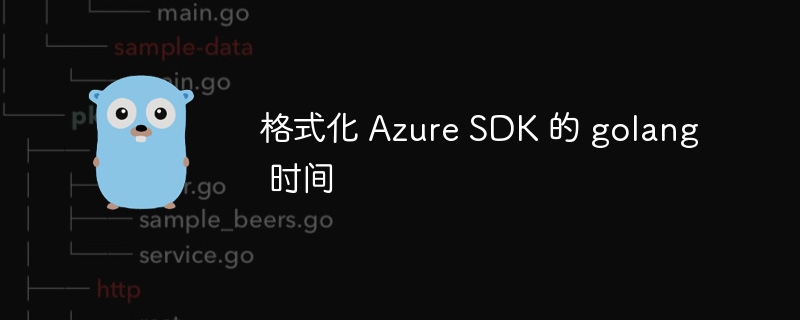Format golang time for Azure SDK

php Editor Xigua will introduce you how to format the golang time of Azure SDK. When developing using the Azure SDK, you often encounter situations where formatting time is required. Golang provides some built-in time formatting methods, but they may not work properly in Azure SDK. To solve this problem, we need to use a custom method to format the time. Next, let's take a look at how to use golang to format time in Azure SDK.
Question content
Consider the following golang
today := time.Now().Format("2006-01-02T03:04:05.9999999Z")
t, _ := time.Parse(time.RFC3339Nano, today)Why doesn’t this equal the simpler
t := time.Now()
?
Based on my experience so far, I would like to confirm if the above code is equivalent (I think it is), or why it is not equivalent. I've also provided some more background information on what I'm trying.
My complete repository code is located in the main.go file on GitHub. However, for the purpose of this question, let's focus on the code snippet provided below.
sasToken, err := client.ListAccountSAS(
ctx, resourceGroupName, storageAccountName, armstorage.AccountSasParameters{
KeyToSign: to.Ptr("key1"),
SharedAccessExpiryTime: to.Ptr(func() time.Time {
t, _ := time.Parse(time.RFC3339Nano, tomorrow); return t }()),
Permissions: to.Ptr(armstorage.PermissionsR),
Protocols: to.Ptr(armstorage.HTTPProtocolHTTPSHTTP),
ResourceTypes: to.Ptr(armstorage.SignedResourceTypesS),
Services: to.Ptr(armstorage.ServicesB),
SharedAccessStartTime: to.Ptr(func() time.Time {
t, _ := time.Parse(time.RFC3339Nano, today); return t }()),
}, nil)Currently, this code works as expected. However, when I simplify the last line to t := time.Now() it results in an error (as shown in Github Actions' Run job).
today 2023-09-18T07:54:42.6314723Z should be formatted as 2023-09-16T11:42:03.1567373Z
tomorrow 2023-09-19T07:54:42.6314723Z should be formattes as 2023-09-17T11:42:03.1567373Z
2023/09/18 07:54:43 POST https://management.azure.com/subscriptions/***/resourceGroups/go-azure-sdk/providers/Microsoft.Storage/storageAccounts/golangazure/ListAccountSas
--------------------------------------------------------------------------------
RESPONSE 400: 400 Bad Request
ERROR CODE: InvalidValuesForRequestParameters
--------------------------------------------------------------------------------
{
"error": {
"code": "InvalidValuesForRequestParameters",
"message": "Values for request parameters are invalid: signedStart."
}
}
--------------------------------------------------------------------------------
exit status 1This leads me to question why equivalence does not hold, contrary to my initial expectations.
Workaround
The API expects times to be rounded to seconds. So try something like this:
...
SharedAccessExpiryTime: to.Ptr(expiryTime.Round(time.Second)),
...
SharedAccessStartTime: to.Ptr(startTime.Round(time.Second)),
...The above is the detailed content of Format golang time for Azure SDK. For more information, please follow other related articles on the PHP Chinese website!

Hot AI Tools

Undresser.AI Undress
AI-powered app for creating realistic nude photos

AI Clothes Remover
Online AI tool for removing clothes from photos.

Undress AI Tool
Undress images for free

Clothoff.io
AI clothes remover

AI Hentai Generator
Generate AI Hentai for free.

Hot Article

Hot Tools

Notepad++7.3.1
Easy-to-use and free code editor

SublimeText3 Chinese version
Chinese version, very easy to use

Zend Studio 13.0.1
Powerful PHP integrated development environment

Dreamweaver CS6
Visual web development tools

SublimeText3 Mac version
God-level code editing software (SublimeText3)

Hot Topics
 Go language pack import: What is the difference between underscore and without underscore?
Mar 03, 2025 pm 05:17 PM
Go language pack import: What is the difference between underscore and without underscore?
Mar 03, 2025 pm 05:17 PM
This article explains Go's package import mechanisms: named imports (e.g., import "fmt") and blank imports (e.g., import _ "fmt"). Named imports make package contents accessible, while blank imports only execute t
 How to convert MySQL query result List into a custom structure slice in Go language?
Mar 03, 2025 pm 05:18 PM
How to convert MySQL query result List into a custom structure slice in Go language?
Mar 03, 2025 pm 05:18 PM
This article details efficient conversion of MySQL query results into Go struct slices. It emphasizes using database/sql's Scan method for optimal performance, avoiding manual parsing. Best practices for struct field mapping using db tags and robus
 How to implement short-term information transfer between pages in the Beego framework?
Mar 03, 2025 pm 05:22 PM
How to implement short-term information transfer between pages in the Beego framework?
Mar 03, 2025 pm 05:22 PM
This article explains Beego's NewFlash() function for inter-page data transfer in web applications. It focuses on using NewFlash() to display temporary messages (success, error, warning) between controllers, leveraging the session mechanism. Limita
 How can I define custom type constraints for generics in Go?
Mar 10, 2025 pm 03:20 PM
How can I define custom type constraints for generics in Go?
Mar 10, 2025 pm 03:20 PM
This article explores Go's custom type constraints for generics. It details how interfaces define minimum type requirements for generic functions, improving type safety and code reusability. The article also discusses limitations and best practices
 How do I write mock objects and stubs for testing in Go?
Mar 10, 2025 pm 05:38 PM
How do I write mock objects and stubs for testing in Go?
Mar 10, 2025 pm 05:38 PM
This article demonstrates creating mocks and stubs in Go for unit testing. It emphasizes using interfaces, provides examples of mock implementations, and discusses best practices like keeping mocks focused and using assertion libraries. The articl
 How to write files in Go language conveniently?
Mar 03, 2025 pm 05:15 PM
How to write files in Go language conveniently?
Mar 03, 2025 pm 05:15 PM
This article details efficient file writing in Go, comparing os.WriteFile (suitable for small files) with os.OpenFile and buffered writes (optimal for large files). It emphasizes robust error handling, using defer, and checking for specific errors.
 How do you write unit tests in Go?
Mar 21, 2025 pm 06:34 PM
How do you write unit tests in Go?
Mar 21, 2025 pm 06:34 PM
The article discusses writing unit tests in Go, covering best practices, mocking techniques, and tools for efficient test management.
 How can I use tracing tools to understand the execution flow of my Go applications?
Mar 10, 2025 pm 05:36 PM
How can I use tracing tools to understand the execution flow of my Go applications?
Mar 10, 2025 pm 05:36 PM
This article explores using tracing tools to analyze Go application execution flow. It discusses manual and automatic instrumentation techniques, comparing tools like Jaeger, Zipkin, and OpenTelemetry, and highlighting effective data visualization






